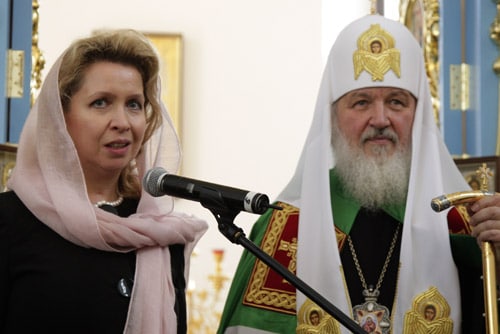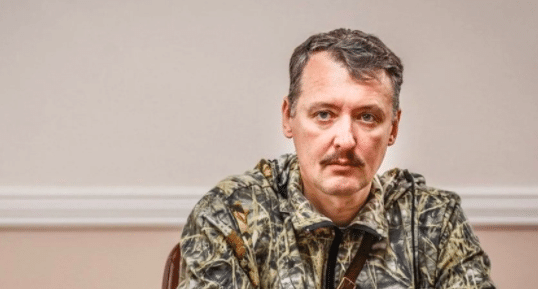Granting Autocephaly to the Ukrainian Orthodox Church in 2019 not only had a strong impact on Ukrainian society’s rethinking of traditional religious symbols – and their role in the pursuit of national identity – but also, not surprisingly, it revealed the secular and clerical sides of Ukraine’s socio-political environment.
The scheduled August visit of Ecumenical Patriarch Bartholomew of Constantinople – the first among equals in the Orthodox Christian world – to Kyiv during Ukraine’s 30th-anniversary celebrations of independence, has become even more important as provocations by supporters of the so-called “Russky Mir” have increased ahead of Bartholomew’s visit. Their aim is to destabilize Ukrainian society and prove that the Kremlin will continue to use religious self-identification as one of its key foreign policy tools.
Moreover, the format of Moscow’s toolkit is filled with manipulative narratives that date back to the times of the Russian Empire: “For the Faith, the Tsar and the Motherland!”. This antiquated worldview helps explain why the Kremlin backs any narrative or cause that helps fascilitate a general feeling malaise, skepticism, and neglect within a targeted population. Then reason being that each of them act as key variables in enhancing Russia’s agenda to deconstruct society by making them more dependent on Moscow’s state structures.
A startling example of this has been Russia’s outright disregard for global solidarity during the COVID-19 pandemic, implementation, and observance of quarantine measures. One of the priorities of Russia’s perceived ‘holiness’ has been the Kremlin’s promotion of what it says are religious, moral, and patriotic values that are aimed at unifying Russian-speaking communities against aliens and enemies. This view of how society should set its priorities places the well-being of people at the bottom on its list.
Most of the countries in Western Europe moved away from embracing a secular, though religiously confessional, culture decades ago – most notably after the Second World War; having, instead, become almost entirely non-religious in all facets of life. In Eastern Europe, as well as in the Middle East and Asia, religious identify remains one of the main building blocks for constructing a national identity that, at times, artificially overcomes any social or political polarization that could potentially destabilize the country in question. This is particularly relevant for countries that are, to some extent, involved in an asymmetric confrontation with stronger players.
The religious question, in these geographic areas, becomes de facto ideological theater of conflict that has the power to supercede any military-political confrontation and nullify arguments about front lines, borders, or territorial integrity. In ideological terms, weaker geopolitical players can achieve considerable success and significantly undermine the soft power of a stronger opponent if they choose the right strategy.
Clear evidence of this can be seen in Byzantine politics of Eastern Orthodoxy, the second-largest branch of Christianity that counts more the 220 million people as parishoners and with patriarchates in places as diverse as Constantinople (Istanbul), Alexandria (Egypt), Antioch, Jerusalem, Moscow, Kyiv, Belgrade, Athens, Bucharest, Tbilisi, Yerevan, Skopje, and Sofia.
Of these, only the Patriarchate of Moscow – with its 120 million followers – has declared what can only be termed as a “canonical war” against the Ecumenical Patriarchate in Constantinople, as well as several other autocephalous Orthodox Churches that continue to follow the lead of Bartholomew and the traditional Orthodox hierarchy. The Russian Orthodox Church has even created its own hierarchy of local churches, thus delineating the boundaries of its independence.

Moscow Patriarch Kirill and Svetlana Medvedeva, wife of former Russian President Dmitry Medvedev, at a church ceremony.
In the more than five centuries since Muslim Turks captured Constantinople in 1453, thus ending the thousand-year-old Byzantine Empire; which also roughly coincided with the rise of Moscovy (the precursor to the Russian Empire) as a major center of Orthodoxy, Moscow has made considerable efforts to reduce Constantinople’s (i.e. the Greek speaking and Hellenic culture-focused branch of Orthdoxy) influence in the Orthodox hierarchy. This messianic position has been regularly advertised by the Moscow Patriarchate for the better part of two centuries ever since it declared Moscow to be Christiantiy’s “Third Rome”.
During the launch of the nation-building processes and the creation of an ever-larger number of Orthodox churches, all of which had an increasingly nationalistic element in their teachings and worldview, contributed to undermining the positions of the Ecumenical Patriarchate in Constantinople, but did not lead to its complete collapse.
Even though an official state religion has not been established in Russia, by default, “being Russian” automatically indicates that the person is an Orthodox Christian. Russia is, indeed, by far the largest Orthodox country in the world both physically and by population, and despite decades of Communist quasi-atheism during the years of the Soviet Union, Russia has not stopped using its historical religious identity as a channel to spread its geopolitical influence.
In 1686, Patriarch Dionysius IV of Constantinople gave the Moscow Patriarchate the right to ordain the newly elected local council of Kyiv metropolitans. However, an important detail was that the metropolitans still had to obey Constantinople and were obliged to build their religious rites around the Ecumenical Patriarch, not via the wishes of the clergy in Moscow.
Due to Russia’s distorted perception of reality (which was justified by its political ambitions), Moscow did not comply and began to re-interpret the synodal letter, which in Orthodoxy is an official document that addresses an issue of doctrine, administration or application. The original text of the synodal letter was lost until the summer of 2018, all of which were eventually made public published. This prompted the Synod of the Ecumenical Patriarchate to repeal the decision of 1686 to eliminate the grounds for the manipulative interpretation of history by Moscow.
The ultimate result of this approach was that Russia’s strategy, which was built on a distortion of historical facts, failed. It isn’t surprising that the visit by Patriarch Bartholomew to Ukraine has caused such a vicseral outburst of dissatisfaction from Moscow. The fact that Bartholomew would even accept an invitation to visit Kyiv and Metropolitan Epiphanius reveals the limitsof the Kremlin’s soft power.
The Russian Orthodox Church is becoming less effective because its attempts to weaponize the issue of religious loyalty in order to destabilize neighboring countries has come at a high price for the Kremlin; a fact that became blatantly apparent at the outbreak of the ongoing War in the Donbass. When the conflict began, the Russian Orthodox Church openly took part in the aggressive pro-Moscow propaganda campaign that was aimed at radicalizing the residents of eastern Ukraine.
The Russian Orthodox Church’s role in helping to create a sort-of gray security zone in Eastern Europe is difficult to overestimate, given the range of actions carried out by the Moscow Patriarchate in the weeks, months, and even years leading up to the start of the war in eastern Ukraine. This includes the alleged use of church property for the storage of weapons and other military equipment, the transfer of parishioners’ money to Russia, the creation of civilian covers for Russian intelligence so that they could carry out sabotage activities in Ukraine.
The culmination of this insidiousness was the Moscow Patriarchate giving its blessing to Russia’s armed forces for their part in the Donbass War, which included promises of an “eternal life” if they carried out the Kremlin’s political ambitions.
The hypocrisy of Moscow Patriarch Kirill and the Crusader-like, pseudo-holiness/religious fanaticism of Russian intelligence operatives, including the infamous former military head of the Donbass separatists – Igor Girkin – laid the groundwork for what still remains one of the greatest threats to the post-Soviet space’s regional security. Not surprisingly, an important change in this situation has been the support of West, which quickly recognized the Orthodox Church of Ukraine.

Igor Girkin, the former Russian intelligence officer, led the Donbass separatists during the early key stages of the ongoing war. Girkin, who went by the nome de guerre “Strelkov” was a military historian and self-described advocate of Russia’s imperial ambitions.
The tides of history played a key role in legitimizing Moscow’s self-styled messianic role in Eastern Orthodoxy’s hierarchy. But, at present, the effectiveness of using religion as a foreign policy tool has become increasingly questionable from the perspective of the Kremlin, especially when taking into consideration that of the 140 million citizens of the Russian Federation, about 20 million of them are indigenous Muslims who have for centuries played major roles in Russia’s development as an empire and later as a modern state. Furthermore, the main areas of instability in Russia since the collpase of the Soviet Union is in the Muslim North Caucasus region, where separatist conflicts, Wahabbist terrorism, and conservative Islamist social norms have all taken hold since 1991.
All of this further undermines the concept of Moscow as the “Third Rome”.
Does this mean that the previously effective strategy of implanting and promoting the influence of the Russian Orthodox Church is gradually beginning to crack at the seams? For now, it appears that in the case of Ukraine, the Moscow Patriarchate’s ability to hold sway over areas that the Kremlin considers its sphere of influence is on the wane.
-------------------------------------------
By: Nicholas Waller
Title: How can Ukraine vanquish Russia on the theocracy chessboard?
Sourced From: www.neweurope.eu/article/how-can-ukraine-vanquish-russia-on-the-theocracy-chessboard/
Published Date: Fri, 13 Aug 2021 14:17:06 +0000
Read More
 UK PoliticsWorld PoliticsVideosPrivacy PolicyTerms And Conditions
UK PoliticsWorld PoliticsVideosPrivacy PolicyTerms And Conditions
